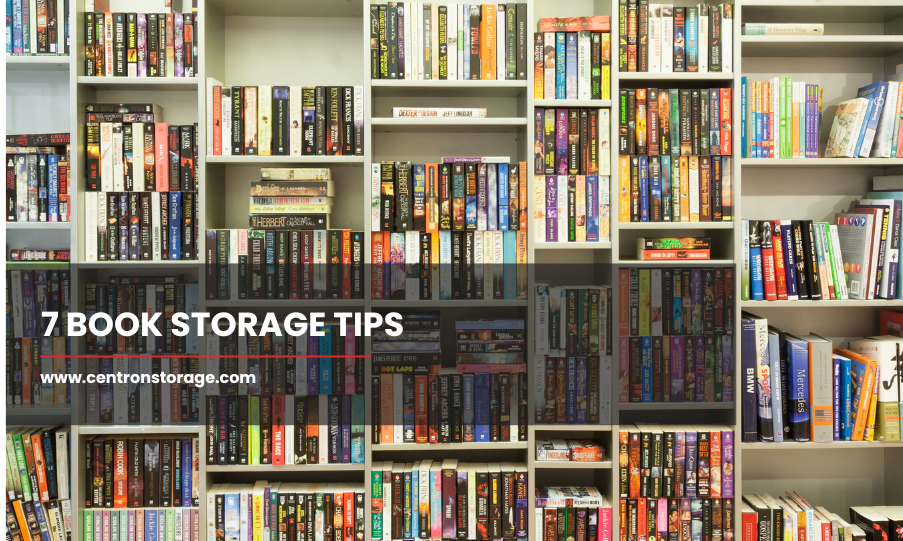7 Book Storage Tips

Books can get damaged or deteriorate if not given proper attention and care. If you’re a book lover, it’s only natural that you want to keep your most beloved tomes in good condition—especially if you have a whole library’s worth of books at home.
Proper preservation of books involves more than just placing them on a shelf. Factors like temperature, climate control, and ventilation play a crucial role in preventing damage such as mold, mildew, and yellowing pages.
Storing your books the right way will allow you to protect the pages for years to come. Whether you’re packing them for long-term storage or setting up an archival system at home, using acid-free materials and maintaining a stable environment will help keep your collection in pristine condition.
Storing your books the right way will allow you to preserve the pages for a long time to come. Here are some effective storage tips you can follow to ensure that you continue to enjoy your favourites:
1. Cover your books with plastic sleeves
One of the most appealing parts of a book is the front and the back covers, which are among the major reasons you may have picked some of your books up in the first place. However, these covers will discolour, become folded, and/or get torn in the long run, especially if they’re used frequently or continuously exposed to the elements.
One great solution is to put plastic sleeves or jackets on the covers. While many may argue that it makes them look cheap on the shelves, it’s a small price to pay for adequate protection from wear and tear.
The benefits of using plastic sleeves or jackets include:
- Keeping dust at bay
- Reducing the chances of cracks and rips on the cover
- Guarding against liquid spills and food debris
- Keeping your covers looking great for a long time.
- Providing additional protection while your books are on the shelf or stored in boxes
Plastic sleeves and covers are not often available commercially due to the variety of book sizes, but they’re quite easy to make.
The benefits of using plastic sleeves or jackets include:
- Keeping dust at bay
- Reducing the chances of cracks and rips on the cover
- Guarding against liquid spills and food debris
- Keeping your covers looking great for a long time.
- Providing additional protection while your books are on the shelf or stored in boxes
Plastic sleeves and covers are not often available commercially due to the variety of book sizes, but they’re quite easy to make.
2. Install proper shelving

Choose the right type of shelves
If you have a significant number of books at home, investing in shelves is a stellar book storage idea. In addition to their organizing and space-saving benefits, bookshelves also employ both form and function that add depth and character to any room.
Here are some advantages you can get with bookshelves:
- Easy access to your books, especially the frequently used ones
- Reduced clutter around the house
- Organized books
- Cozy, relaxing atmosphere and aesthetically pleasing rooms
- Protection from damage caused by accidental drops, and spills
- More space
However, installing just any bookshelf won’t benefit you in the long run. You must choose bookshelves made out of durable and great-quality material to ensure you are getting maximum protection.
Consider the following options:
Metal Shelving – These are ideal for storing books since they are more durable than wood. Furthermore, metal shelving can carry the combined weight of heavier books, preventing them from sagging over time.
Treated Wooden Bookshelves – Shelves made out of wood are excellent in most cases and are less expensive than metal shelving. However, take careful consideration of the type of wood you choose. Oak, for example, is acidic and can damage books. Make sure the shelves are treated with water-borne polyurethane varnish that prevents acid transfer.
Bookshelves with Glass Doors – These kinds of shelves provide better protection than open-air ones since the glass doors prevent your books from accidentally flying off the shelf in case of accidental knocks. The glass doors also safeguard your books from children wanting to play with them.
3. Keep books away from UV light

Strong UV light or direct sunlight can be harmful to books in several ways and can hasten the deterioration process. If neglected, continuous exposure to light can lead to these disastrous results:
- UV light can cause colours on the book cover to fade and become dull.
- Exposure to sunlight can turn the pages of a book yellow and develop brown spots.
- Heat can dehydrate paper and can make pages brittle.
To avoid this, here are a few things you can do:
- Avoid placing your bookshelves or book storage boxes near windows.
- Install curtains or drapes to block the sunlight during afternoons and other times when sunlight is strong.
- For books requiring long-term storage, place them in a reliable storage unit facility
4. Make sure books are placed straight and upright

When you have some extra space on the shelf, books tend to tilt towards the sides. This can cause your books to slump, distorting the internal structure.
To prevent this from happening, here are some things you can try:
Using bookends to keep books standing upright is one good book storage idea for small spaces.
Keep shelves full, but don’t cram too many on one shelf to make it easier to remove what you need.
Sort books according to their sizes on shelves.
Store large and heavy books in the horizontal position to prevent them from tilting over other books.
5. Avoid storing books in places with water
Water can easily turn paper materials into pulp — books are no exception. A single drop of water can wrinkle and distort pages while causing the ink to bleed across the page and into several layers.
To ensure that your books are safe from water damage, avoid storing them near water supply (like the sink) or places prone to leakage or flooding (like the basement).
Another option would be to store your books inside plastic book storage containers, which are highly resistant to liquid.
6. Do not store books in damp areas
It doesn’t take a full-blown flood to destroy your book collection. Even small amounts of moisture can do a number on paper materials as well. Avoid humid or damp areas for storage since this promotes mould growth.
As much as possible, make sure to store books in areas with 50% relative humidity (RH), especially for long term storage.
7. Dust your shelves and keep them clean

A simple dusting goes a long way.
Dust may seem innocuous, but it can eventually damage book covers and pages owing to its acidic properties. Additionally, paper materials attract dust, which can easily accumulate and slip between pages, disrupting the order and longevity of your collection. If you have questions about the best way to maintain your books, following a few essential steps can help ensure their protection.
Dust prevention is a must for books, regardless of whether you’re keeping them on a shelf, inside a cabinet, or storing them in containers for the long term. A well-maintained system of book care ensures your collection remains tidy and in prime condition. Whether you collect books by a favorite author or a diverse mix of genres, proper storage will help maintain their value for yourself and others who may enjoy them in the future.
Here are some things you can do:
- For long-term book storage solutions, keep books inside airtight boxes or plastic containers to protect them as if they were part of a well-maintained archive. Choosing the right kind of storage materials will help prevent damage.
- Dust bookshelves using a good feather duster or paintbrush at least once a week to keep your collection neat.
- Use a vacuum cleaner at low settings to suck out dust particles without disturbing the categorization of your books.
Book lovers around the world can attest that books enrich lives. Even with digital copies available, for many, there’s nothing quite like holding an actual book in your hand. It doesn’t matter whether you limit your collection to a specific genre or have a more eclectic selection—keeping them well-organized and properly cared for will extend their lifespan and maintain their appeal.
If you’re looking for an excellent book storage solution in the North York area, contact Centron Self Storage at (416) 739-0000. We offer great deals and will be happy to provide you the best service possible.
